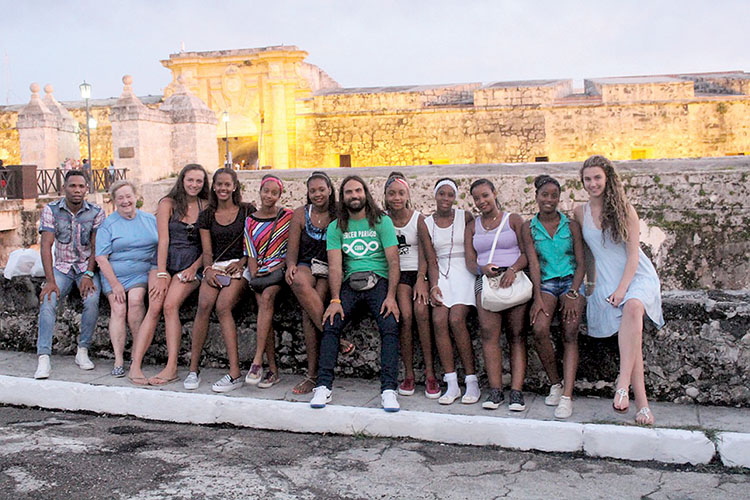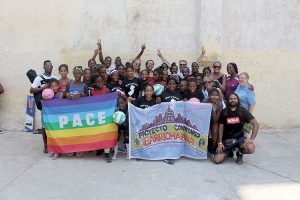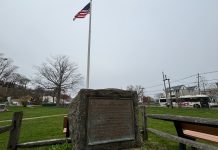By Muriel J. Smith
RED BANK – Let the governments of the United States and Cuba quibble and argue over their policies, but two volleyball players from Red Bank Catholic High School took positive action last week and demonstrated to Cuban teenagers just how friendly Americans really are.
Junior Catherine Curtin of Atlantic Highlands and senior Ava Zockoll of Bay Head spent a week in Havana, traveling with parents Dan and Tricia Curtin and Nancy Zockoll, under the auspices of Cuba Educational Travel, to bring GUEST – the Girls Universal Empowerment Sports Tour – to this third world country which suffers as much poverty and need as many other nations where assistance programs are already in place.
It was Catherine’s idea to bring friendship, knowledge, and the start of an easy camaraderie among young people in the largest city of a country 90 miles off the U.S. Southern border. “I was fortunate enough to travel with my parents to Cambodia several years ago,” Catherine said, “and the sight of the poverty there has remained with me since then. I wanted to do something to help someone less fortunate than us, and with Cuba just opening for American visitors again, I thought that would be the perfect place.”

Catherine also knew that as popular as volleyball is in the United States, it’s even more so in other countries. So, with the help of her parents, Catherine contacted the American Embassy in Cuba who put her in touch with Cuba Educational Travel and GUEST, Catherine’s newly formed group, was launched.
Catherine’s teammate senior Ava Zockoll, captain of the RBC girls’ team who also plays for Central Jersey Volleyball Academy, and a seasoned traveler herself, was ready, willing and able to take on the challenge of bringing American friendship to Cuba.
Cuba Educational Travel put them in touch with Pavel Garcia Valdes and his wife Sandra Sotolongo Iglesias of Proyecto Comunitario Barrio Habana. The couple work tirelessly on the streets of Havana to give a better life to people of all ages. Pavel is as comfortable and efficient encouraging a group of teens on the street through the educational and social aspects of improving their lives as he is trying to find enough drinking water to keep a day care center open so senior citizens can enjoy the friendship and social benefits of others of all ages.

The American teens came to Cuba armed with gifts for their soon-to-be friends – volleyball nets, kneepads, volleyballs, game shirts in two colors for opposing team play, as well as open hearts and huge smiles. They left the comfort of air-conditioned gyms and well-polished courts and quickly adjusted to old, cracked concrete outdoor courts with boundary lines faded by the hot sun. All play was wrapped up by noon on any day when afternoon temps went well into the mid-90s.
Volleyball, the warm-ups and exercises are all international, so not knowing the language did not present a disadvantage. What were shy exchanges of broken English and Spanish on the first day turned to laughs and friendly handshakes on the next, and later genuine laughter and friendship. On the last day, there were tears when they said their goodbyes amid promises of return visits.
“If you can help people in one way, such as by sharing a sport, then you can connect on another level,” Catherine explained. She was surprised at the English speaking skills – however limited – that many of the girls had, and loved the welcoming attitude they exuded from the very first day.
Ava agreed, pointing out that one of the reasons she wanted the experience was to be absorbed in another culture and help people with fewer opportunities than she herself has. She was surprised the Cuban teens did not appear to be as poverty-stricken as she had heard they were, and was impressed not only by the quality of the coaches but also their intensity and excellence in training the girls. Both teens commented on how polite, courteous, and well-mannered their Cuban counterparts were.
Afternoons were spent with Pavel and an Educational Travel rep who took the American visitors through a series of cultural and educational experiences including a visit to a senior care center where the oldest client at 102, walks from his home on the third floor of a once well-maintained apartment the few blocks to the center where he can enjoy games, friendship, song and meals with other older Cubans. The group also visited a third floor walk-up apartment of a husband and wife renowned for their hip-hop music in clubs and cabarets across the country. The couple, who are black, were eager to speak about racism and said they both believe strongly it exists in Cuba.
There was also a visit with Edel Bordon and his wife, Marina, and their children Pablo and Lucy. One of the finest artists in the country, Edel teaches art in his large and elegant 10th floor apartment overlooking the Atlantic Ocean, a home filled with the artwork of both Bardon and his students, as well as the photography of son Pablo.
In between, there was a salsa dance lesson and a visit to Morro Castle where they experienced the nightly cannon firing by Cuban soldiers, dressed in colonial garb which dates back to the Spanish rule of the 17th century. Citizens set their watches by this 9 p.m. ritual, which commemorates the centuries when the cannon was fired each evening to tell residents to hurry behind the protective walls of the fortress before the gates were locked against marauders, pirates, and other evils.
Although trips to private homes and historic sites were all planned by Cuba Educational Travel, the group could go their own way individually or together in the afternoons and evenings. Even with the limited experience, both Catherine and Ava felt they had made new friendships and had a positive effect on their counterparts’ opinion of the United States.
Ava felt the best gift she left behind was showing the Cuban students they too can meet and interact with people they have never met in a positive way. Catherine agreed, and felt she also had given her new friends a better understanding of the American people.














